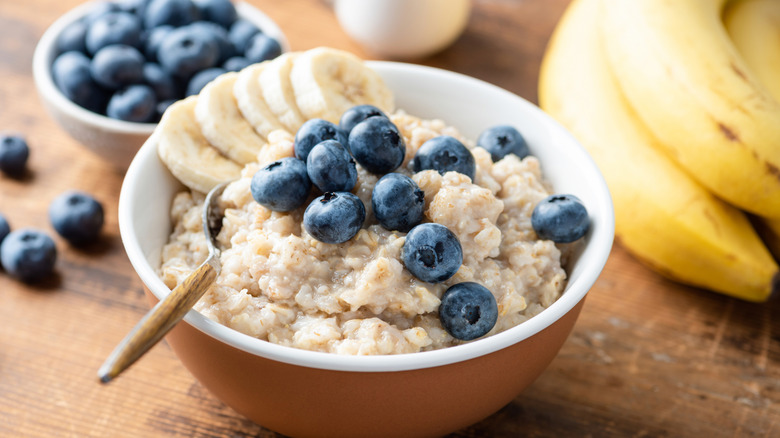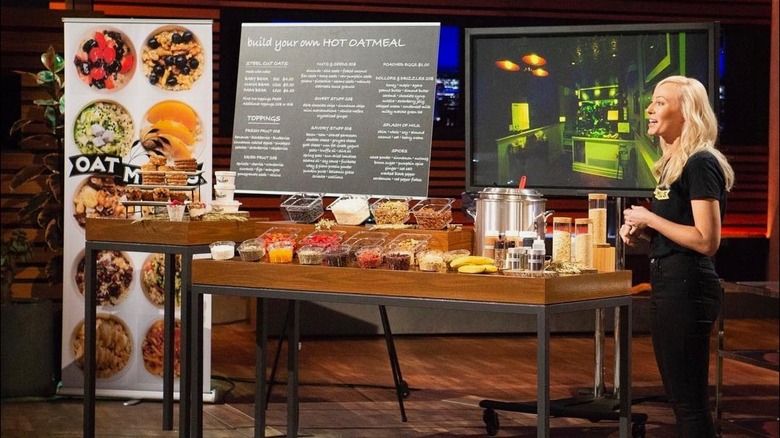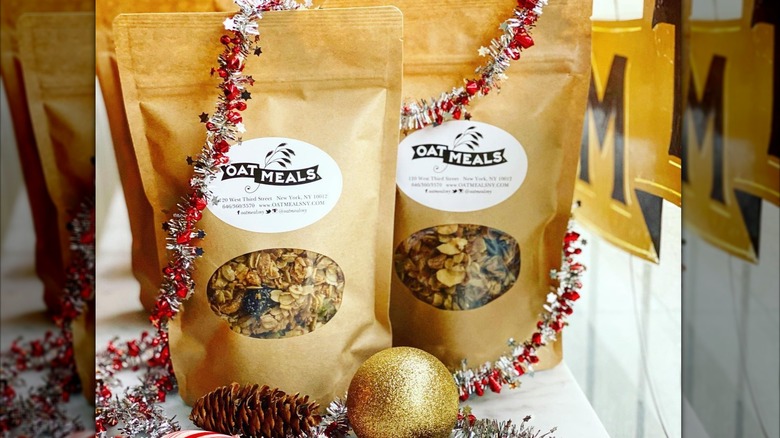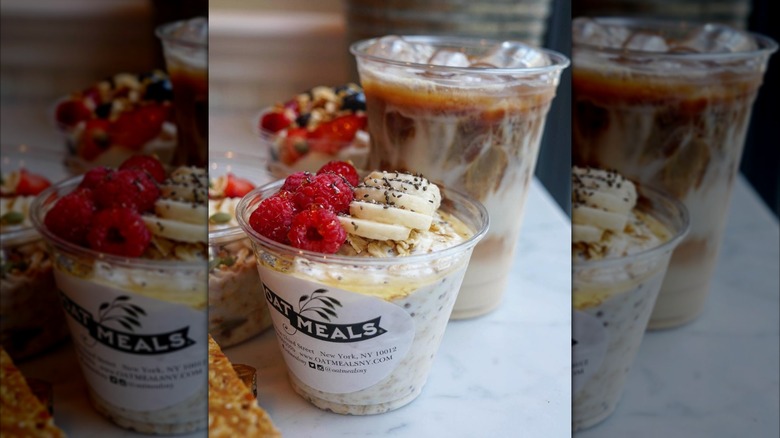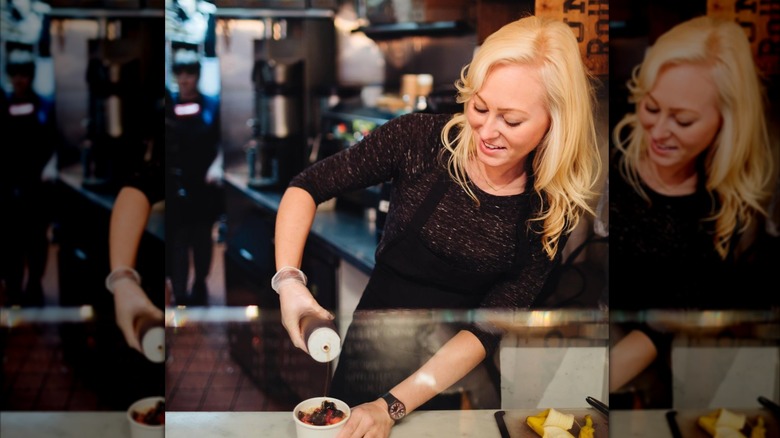OatMeals: Here's What Happened After Shark Tank
A New York City entrepreneur brought her unique oatmeal business to "Shark Tank" to see if the Sharks would bite and give her the funding she needed for nationwide expansion. Sam Stephens, founder of OatMeals, appeared on season 10, episode 7 (which aired December 2, 2018), asking for a $500,000 investment in exchange for a 20% stake in her business.
OatMeals, a build-your-own oatmeal café, brought a new twist to a common breakfast food, innovating delicious oatmeal combinations for the morning meal as well as savory creations for lunch and dinner. Each menu item began with cooked steel-cut oats — which are different than quick-cooking rolled oats — and was then transformed into various combinations utilizing nearly 80 topping options. Stephens was currently operating out of one small shop in New York City's Greenwich Village but hoped, with the help of a Shark, to expand to additional locations within New York City before ultimately taking her restaurant concept nationwide.
Stephens formerly worked as an executive assistant in the investment banking space — but creating OatMeals was her dream. She went to culinary school while working full-time and eventually left her career to pursue the restaurant. At the time of the "Shark Tank" taping, her shop had been open for six years and had experienced growth each year during that time. Shortly after opening OatMeals, she was also approached by Quaker Oats to become a paid company spokesperson, which netted some good organic press for her business.
She explained to the Sharks that she had made $2.5 million in profits during her six years in business — though she hadn't been able to pay herself very much as the company owner, only about $40,000 the previous year.
What happened to OatMeals on Shark Tank?
Sam Stephens presented her pitch to Sharks Mark Cuban, Barbara Corcoran, Lori Greiner, Kevin O'Leary, and Daymond John. She provided samples of her oatmeal creations, including her savory Truffle RisOATto and two sweet oatmeal bowls. The Sharks went wild over the samples, with Cuban calling them "incredible" (via YouTube). Greiner stated, "These are some of the most delicious things ever brought in here" (per YouTube).
Greiner and Corcoran each made Stephens an offer. Greiner mentioned Bantam Bagels, one of her previous "Shark Tank" deals, which she was able to get into Starbucks locations and grocery stores. She felt a similar model was the right move for OatMeals. Stephens would have to be open to packaging and selling her oatmeal in retail locations and, essentially, completely pivoting from her current business approach. Greiner offered the asked-for $500,000 investment in exchange for 33⅓%, saying she wanted to be a third partner in the business. However, her offer was contingent on getting a packaged foods deal.
Corcoran said she had a different take on OatMeals and the direction the business should go. She felt Stephens should adopt a food cart model and take her food to corporate America. She offered $500,000 in exchange for 50% of Stephens' food cart business — she didn't want a stake in the existing restaurant model. A caveat was that Stephens could only use the money to develop the food cart business; none of it could be funneled into the existing restaurant. Corcoran mentioned Cousins Maine Lobster, one of her previous "Shark Tank" deals, which she helped grow from one food truck to a fleet of 40, and emphasized that Stephens should take her deal to achieve similar success. Ultimately, though, Stephens accepted Greiner's deal.
OatMeals after Shark Tank
When a company goes silent about its "Shark Tank" experience after the show airs, it generally doesn't bode well. Though OatMeals struck a deal with Lori Greiner on the show, the company only published a few social media posts mentioning "Shark Tank" or Greiner following the episode's premiere. There was no fanfare about the experience, no "Shark Tank"-related promotions from the business, and no updates about progress with Greiner. The reason for this was revealed in the comments thread of an April 2021 Facebook post from OatMeals. To a follower asking if the shop was still open and stating they hoped Greiner had helped OatMeals stay in business, the company replied that the deal with Greiner "did not work out" (per Facebook).
OatMeals' Greenwich Village shop continued doing business as usual after the founder's "Shark Tank" appearance. However, OatMeals' products never made it onto store shelves or the Starbucks menu. Sam Stephens also didn't achieve the aim she had sought funding for, which was expanding her shop to additional locations.
On the show, Kevin O'Leary warned Stephens that Barbara Corcoran's deal was safer. Mark Cuban pointed out that Greiner's deal was founded entirely on a product Stephens didn't yet have while Corcoran's offer would take what Stephens was already doing and replicate it more profitably and efficiently. Cuban further reminded Stephens that Greiner's deal was contingent on getting retail distribution, pointing out that if she didn't get it, there would be no deal. At the time, Greiner confidently stated that Stephens would get the distribution. Clearly, though, that ultimately didn't happen. After Stephens left the Tank that day, Corcoran told Greiner — prophetically, it turned out — that she had "sent [Stephens] down the wrong path" (per YouTube).
Is OatMeals still in business?
Like so many restaurants, OatMeals wasn't able to survive the COVID-19 pandemic. Sam Stephens remained with her previous business model and one-shop operation after her "Shark Tank" deal fell through, working month to month to keep her restaurant open. When the pandemic hit and began affecting New York City businesses in earnest, OatMeals initially responded to its suddenly and significantly reduced revenues by shortening hours of operation and fulfilling orders via pickup and delivery. By March 18, 2020, though, the shop had closed its doors, and all staff had been laid off. Unable to pay her rent on the small but expensive Greenwich Village location, Stephens tried unsuccessfully to get relief funding being offered for businesses like hers. She also set up a GoFundMe campaign, hoping to stay in business through donations.
In May 2020, OatMeals reopened for delivery, pickup, and socially distanced in-shop ordering. The shop was able to sustain business through this approach until January 24, 2021, when it finally closed permanently, citing COVID-19 as the reason for its shutdown. OatMeals continued posting recipes for its social media followers as well as selling its house-made Signature Granola for a time through an online shop; as of November 2025, however, the product was listed as "sold out" on the company's website. Though the OatMeals website is still operational, a banner at the top of each page alerts visitors that the shop closed in 2021.
What's next for OatMeals' founder?
Sam Stephens commented on social media that she hoped OatMeals might return once the pandemic was over. OatMeals' Facebook account hasn't had any new posts since 2022, however. Stephens' LinkedIn account shows that she took a marketing job in June 2021 and still holds that job, as of November 2025.
The OatMeals website mentions that, in the wake of the store closing, Stephens was working on a recipe blog and a cookbook to bring her oatmeal creations and innovative savory oats recipes to the world. There is no further information about either on the website, and internet searches turn up no results for either a blog or a cookbook connected to Stephens. So, it's possible that those projects are forthcoming or that Stephens has abandoned the endeavors.
The only hint that OatMeals may not be gone forever is a mysterious January 2024 post on the company's X account. The post simply shows a close-up of a mobile food permit sticker issued by the City of Dallas for 2024 — no accompanying text, no explanation. The state the permit was issued in isn't specified on the sticker — there are multiple U.S. cities named Dallas — but the logo on the sticker matches the city logo for Dallas, Texas. The company Stephens currently works for, per her LinkedIn profile, has operations in Dallas, Texas. So, it's conceivable that Stephens may have attempted — or may currently be attempting — to revive her food business in that city via some type of food truck. Ironically, if that's the case, she would be essentially following the mobile food cart pathway Barbara Corcoran offered her on "Shark Tank" that she turned down. Whether that's the case, however, is not known.

